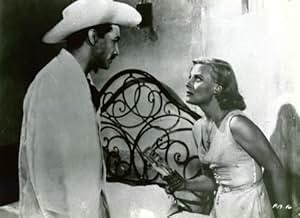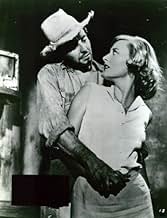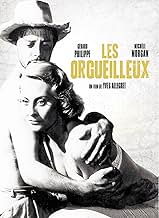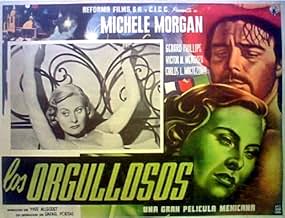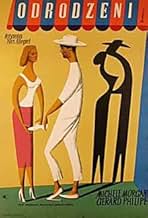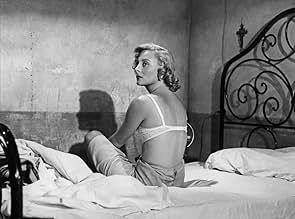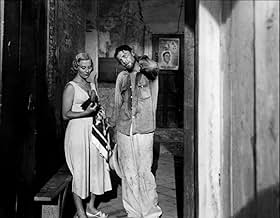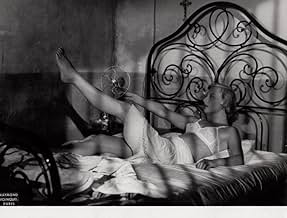In einem kleinen mexikanischen Dorf liegen Lebensfreude und Leid, Hoffnung und Schmerz, Leidenschaft und Schuld, Liebe und Verfall, Leben und Tod dicht beieinander und durchziehen das Leben ... Alles lesenIn einem kleinen mexikanischen Dorf liegen Lebensfreude und Leid, Hoffnung und Schmerz, Leidenschaft und Schuld, Liebe und Verfall, Leben und Tod dicht beieinander und durchziehen das Leben der Dorfbewohner und zweier Franzosen, die während einer Typhus-Epidemie dort gestrandet s... Alles lesenIn einem kleinen mexikanischen Dorf liegen Lebensfreude und Leid, Hoffnung und Schmerz, Leidenschaft und Schuld, Liebe und Verfall, Leben und Tod dicht beieinander und durchziehen das Leben der Dorfbewohner und zweier Franzosen, die während einer Typhus-Epidemie dort gestrandet sind.
- Für 1 Oscar nominiert
- 1 Gewinn & 3 Nominierungen insgesamt
- Smuggler
- (Nicht genannt)
Empfohlene Bewertungen
Anyway, the torrid, crisis-torn setting (which invariably brings together a number of disparate characters) actually recalls a number of excellent contemporaneous French films – H.G. Clouzot's THE WAGES OF FEAR (1953) and two by my favourite auteur Luis Bunuel, DEATH IN THE GARDEN (1956) and REPUBLIC OF SIN (1959), with which this one even shares composer Paul Misraki and leading man Gerard Philipe respectively! In fact, here we deal with a village combating a meningitis epidemic: the local medic (played by Carlos Lopez Moctezuma – who apparently is no relation to Juan, cult director of "Nunsploitation" flick ALUCARDA {1975}) soon has his hands full with patients; Philipe, an ex-French doctor who took to the bottle after his wife died in his own care, helps out while being made a laughing stock of by the inhabitants. The first case is the spouse of elegant French lady Michele Morgan – in the second of five pictures she and Philipe appeared in, though two were compendiums and one a documentary in which the stars were featured as themselves! She takes an instant dislike to her grimy compatriot, yet becomes increasingly dependent on him when her own hubby perishes and the innkeeper forces himself upon her (typically more permissive than comparable Hollywood films of the era, Morgan is repeatedly seen in her underwear on account of the excessive heat) – she also incurs the jealousy of the latter's wife, another French expatriate. Finally, Philipe rekindles his vocation and decides to remain sober – while the heroine, who had intended leaving before a quarantine was ordered sealing off the village from the outside world, opts to stay behind due to her new-found feelings for the male protagonist
The handling is sturdy and the atmosphere vividly rendered, aided in no small measure by the cinematography of Alex Phillips (who had also lensed Bunuel's ASCENT TO HEAVEN and ROBINSON CRUSOE {both 1952}), the production design of Gunther Gerszo (who, apart from Bunuel's SUSANA {1951} and THE RIVER AND DEATH {1955}, would be responsible for several "Mexi-Horror" efforts) and a lively score – accentuated by loud yelps redolent of Latin American nonchalance! – from Misraki (later a collaborator of Orson Welles, not to mention exponents of the "Nouvelle Vague"). That said, there is an odd emphasis on showing its main characters humiliated (and at inordinate length, to boot!): now- penniless Morgan goes to wire her relatives in Paris for money, but she is forced to change pens numerous times because they run out of ink or break and then reduce her message because it exceeds the amount borrowed from the innkeeper!; Philipe, too, is literally made to dance for his share of rum (the drunkard act is slightly overstated, to be sure) – on the other hand, when he has to assist the doc in vaccinating Morgan and ordered to wash his hands, he complains that it will take another eight day's filth to bring them to their current state but, then, they are cleaned up in no time at all! Another minor quibble: with this type of film, there is usually some questioning of religious faith vis-a'-vis the significance of the plague – but, despite the obligatory presence of a curate, there is little of that feeling here!
I had missed out on a solitary screening of the movie under review (which, by the way, finds a place on the "Wonders In The Dark" website's ranking of the all-time top 3000 movies – while the Leonard Maltin guide, where it was listed under the alternate international title THE PROUD ONES, saw fit to raise its rating from *** to ***1/2) on a French Cable TV, where it was broadcast without the benefit of subtitles; normally, the channel concerned at least provided a French transcript of the dialogue – but this practice has long since been dropped! As for director Allegret, it is the fourth (and perhaps best) effort of his that I have watched after DEDEE' D'ANVERS (1948), MANEGES (1950) and LEATHERNOSE (1952); I also own one of his most highly-regarded works, SUCH A PRETTY LITTLE BEACH (1949; also with Philipe) while I did not take advantage of a late-night scheduling of MIRACLES ONLY HAPPEN ONCE (1951) – and as for the French-Italian anthology THE SEVEN DEADLY SINS (1952; one of the Philipe/Morgan collaborations I alluded to earlier on), it is only readily available via a trimmed Italian print!
Yves Allégret was extraordinary when it came to making you FEEL what his characters endure:so strong the pictures are that we're hot,we sweat as much as them.He did the same in "une jolie petite plage" where the rain never stopped falling.Maybe he learned his lesson from Victor Sjostrom(Seastrom) who could make us feel" the wind" ,and in a silent movie at that.
Gerard Philipe is tremendous as the drunken ex-doctor with a terrible secret; he was able to forget that he'd become the official leading man of French cinema, star of the Cinema of Quality that Truffaut detested so much. Ditto for Michele Morgan, whose parts usually had aristocratic backgrounds, or at least great wealth. As the not-very-grieving widow of the first disease victim, she holds the picture together, making sure we don't get too swayed by Philipe's lowlife antics.
Directed and adapted by Yves Allégret with contributions from the legendary Aurenche and Bost, it is set in a fly-blown harbour town during a meningitis epidemic and stars two of France's finest, Gérard Philippe and Michele Morgan, both of whose class enables them to rise above the grubby milieu. Philippe both excels and engages one's sympathy in a role that could so easily be a caricature. Mlle Morgan's innate sensuality is singularly sweaty here and Martin Scorcese admits that the sight of her lying on a bed in her lingerie whilst cooling herself with ice cubes 'troubled his adolescence'.
Cinematographer Alex Phillips has brillianty captured the seedy surroundings and oppressive heat but the soundtrack of yelping musicians becomes rather tiresome.
The final Hollywood-style clinch is not the ending that Allégret would have chosen and was apparently shot by an operator in the Boulogne studios against a painted sky.
Allégret had reached his peak with three 'noirs' in the 1940's and this work from 1953 is generally regarded as his last film of note.
Wusstest du schon
- WissenswertesJean-Paul Sartre wrote ten drafts for screenplays to be used by Columbia Pictures, of which only three were typed down. The other seven were sort of rejected, and one of these, 'Typhus' came to be the obvious inspiration for Les orgueilleux/Los Orgullosos, Yves Allégret's co-production with Mexico. The film won the Bronze Lion in the 1953 Venice Film Festival, ex-aequo with La guerra de Dios (1953), Polizei greift ein (1953), and Die schwarze Haut (1953), and also a Special Prize from the same Jury. When the film was nominated for Best Writing, Motion Picure Story, for the 1957 Academy Awards - in the wake of the film's release in the USA, with promotional materials emphasizing it was "Jean-Paul Sartre's The Proud and the Beautiful", the French philosopher disowned his authorship. The film has also been said to be based on Sartre's novel, "L'amour redempteur"... which he never wrote! This myth did not end, even after its exposure as such in "Feature Cinema in the 20th Century: Volume One: 1913-1950: a Comprehensive Guide", by By Jacek Klinowski et al.
- VerbindungenFeatured in Censura: Alguns Cortes (1999)
Top-Auswahl
- How long is The Proud and the Beautiful?Powered by Alexa
Details
- Erscheinungsdatum
- Herkunftsländer
- Sprachen
- Auch bekannt als
- The Proud and the Beautiful
- Drehorte
- Produktionsfirmen
- Weitere beteiligte Unternehmen bei IMDbPro anzeigen
- Laufzeit1 Stunde 43 Minuten
- Farbe
- Sound-Mix
- Seitenverhältnis
- 1.37 : 1
Zu dieser Seite beitragen


